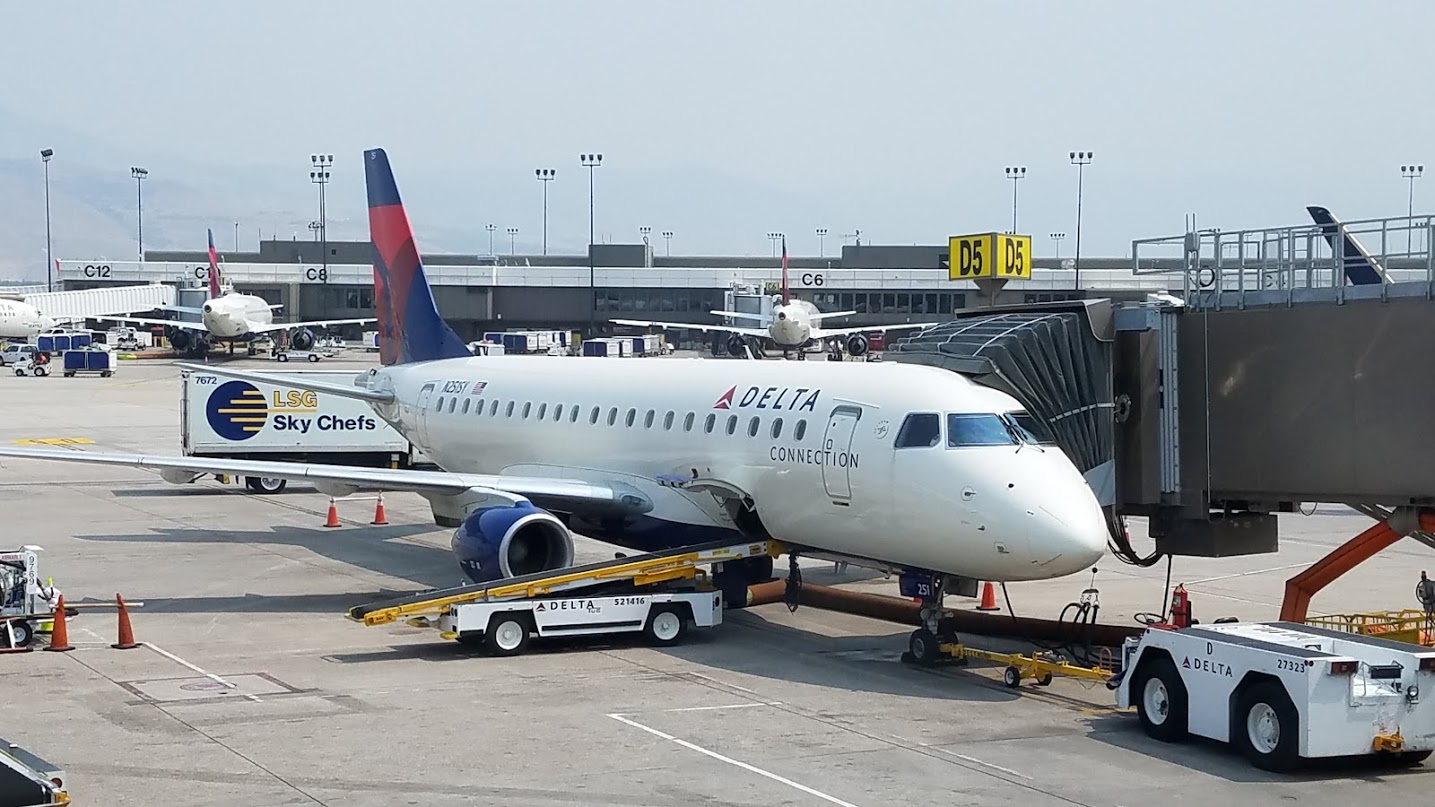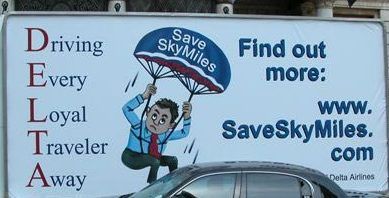Delta Air Lines is a fierce competitor. They play hard ball, whether it’s with politicians, with airlines they’d like to partner with, or with customers. I’ve said before that in a 50-50 deal, Delta takes the hyphen.
There’s been a lot of discussion about a warning letter from Delta to a customer that was first posted to a Facebook group, covered by Rene’s Points, and then commented on by One Mile at a Time and Live and Let’s Fly.
This letter is being issued to express our concerns regarding your ticketing practices in the past months. Your actions have been brought to my attention and I have been asked to contact you on behalf of Delta Air Lines.
Our reports indicate that most recently you were trying to use the San Francisco construction waiver to change the length of your itinerary at no charge. Quite honestly, your SkyMiles account is heavily documented with the many exceptions to our policies that you ask for and fare rules that you try to get around. You repeatedly call our Reservations and High Value Customer desk to get what you want and if you don’t you hang up and repeatedly call until you get what you want.
Your manipulative practices are unacceptable and we are sending you this warning letter to caution you that we will not allow this to continue. If you persist in engaging in this type of business practice, we will be forced to review your current Medallion benefits as well as your current status.
Going forward, we strongly encourage you to conduct yourself in an honest and respectful manner and treat Delta with the respect that we give you.
Regards,
Customer Care
Delta Air Lines

I’m not going to delve into the authenticity of the letter. A version was posted on letterhead, the particulars of it aren’t what’s important. It actually serves as a good reminder of our position relative to that of the airlines.
Delta’s Revenue Protection Unit Goes After Customers Who Follow the Rules
Back when frequent flyer miles were earned based on how far you flew (distance) and elite status was also based on distance flown rather than dollars spent, mileage runs were common. However Delta would threaten customers who were buying fares the airline offered, following the rules of those fares to the letter.
A fare might allow more connections than necessary to get from A to B, but a customer buying those connections might run head long into Delta’s Revenue Protection Unit which I first learned about in April 2001 when a group of flyers came up with great excuses to offer to the RPU.
My personal favorite reason for adding a connection also became my favorite reason for needing a particular routing when using throwaway ticketing: ““I’m having an affair in this third city, and I just need a 40 minute connection in the lounge there…”
Delta Went to the Supreme Court to Defend Acting Against Customers Who Follow the Rules
Since the merger was already complete by the time the case found its way to the Supreme Court it was actually Delta that argued Northwest v. Ginsberg which held that an airline can’t be held to an obligation of good faith and fair dealing in its frequent flyer program (that state-level contract claims are pre-empted by the Airline Deregulation Act). Delta’s argument was that consumers have no rights other than those the airline says they have and this view prevailed.
The case of Northwest v. Ginsberg was also known as the case of ‘the Rabbi Who Complained Too Much’ and was fired as a customer – his status benefits taken away – because he was unprofitable to the airline. He’d complain about each trip and get compensation each time. Instead of no longer giving compensation they took away his status.
In the case of Ginsberg, and the new letter in question, the airline is saying that a customer who follows the rules as written but who benefits more than the airline wants them to is engaged in “unacceptable” and “manipulative practices” that could “force[..]” th eairline “to review [the member’s] current Medallion benefits” and status.

The Viral Letter Scolds a Customer For Benefiting Too Much From the Rules
Following the rules as written is considering not “conduct[ing oneself] in an honest and respectful manner” to the extent that it benefits the customer and not Delta.
Would it surprise you to know that many loyalty programs participate together in a ‘fraud working group’ and that many members of this group believe that ‘benefiting too much’ from a program is fraud (yet changing the terms of the program after members pay money and earn miles is.. not)?


This is still news? Anything new here?
@ Gary — If this letter is real, I would love to know exactly what he has done to pias them off. I guess we will never know.
while airline can treat customers like 8 yr-olds or total idiots, in saying they are enhancing customer experience when actually degrading them, the smart ones cannot play by their rules when airline thinks its own rules, ones they set up themselves, put itself in disadvantage in any scenario.
we should all be in airline business, its a protected win.
It is commonly understood that a company who files bankruptcy is genius for using the laws in their favor but a consumer who files bankruptcy is a flake!
Which airline/hotel loyalty programs participate in a “fraud working group” and under which group’s auspices does it work? Does it have antitrust immunity in each and every jurisdiction in which those programs operate?
I too would like to learn more about the “fraud working group”. Now that would be an interesting post.
The letter doesn’t sound authentic to me. “I have been asked to contact you” on an unsigned letter? And coming from “Customer Care”? “Quite honestly,”? Overall, it’s just not the kind of business/legal language a company would put out.
But the larger point you make is important. If they don’t like people who are able benefit from their policies and rules, they should change them. Actually they do that all the time, and almost always to our detriment. It looks here, though, as if the person getting the letter, if he actually exists, was constantly seeking exceptions to fare policies. The solution to that would be to just say no. (Tell the Leffs of the world that they will need to find other ways to conduct their “affairs.”)
I read somewhere that an Exec at United complained about Elites “gaming the system” by for example finding/booking discount business tickets to earn status. It’s called consumer choice.
And when I read this blog post it’s quite clear that these airlines have become a little too complacent.
Forget loyalty and this mindset. I’m disloyal and will continue to find the routes, airlines, and price that are best for me. Delta get’s next to no of my spend and now United is next. Spend a lot of time in the US but as an international traveler my options are staggering.
I see a lot more airlines like LaCompanie and even Spirit succeeding in growth because the big three thinks that choice is fraud.
In these past 8-10 yrs I’ve moved thru some stages, from wondering and early guilt about taking advantage of the points earning, to having to acknowledge that the companies have always profited from these same programs, with their own credit card schemes and unconscionable advertising on flites as a prime, obnoxious example. Indeed one has only to look at the ratcheting up of requirements for earning status in the last few years – with the almost obscenely complex crediting schemes they have invented – to recognize how manipulated the field is.
And the removal of award charts (duh).
I retired in 2004 as a Delta MM. For over 25 years as a road warrior under the old system of miles flown and award charts, I was the epitome of a Delta loyalist ( living in Atlanta that’s not unusual). In the 15 years since I have expended all my remaining miles and fly Delta at most one trip per year. SW has earned my current loyalty.
My major rule breakage with Delta involved back to back ticketing to obtain the ‘Saturday night stay discount” when I had weekly flights to Boston over a 6 month period in the late 90s. Apparently their software wasn’t sophisticated enough to target me back then.
Delta is a Terrorist Organization
I have no idea if that letter is authentic but, assuming it is, I don’t find it problematic. Frankly, if you’re a sophisticated (conniving?) enough customer to be repeatedly taking advantage of obscure loopholes like “construction waivers” to avoid airline rules that apply to the “little people,” you can take care of yourself. In such circumstances, you’re playing a cat-and-mouse game where neither party has any claim to the high moral ground. Let Delta and this supposed customer determine their business relationship themselves. The idea that Delta is “screwing over” this obviously very bad customer is absurd.
The letter sounds fake, but what apparently is beyond dispute is that Delta and apparently other airlines have departments called “revenue protection.” That’s the key takeaway from this story. If a department is going to “protect revenue,” it better be able to demonstrate that it creates value for the company that exceeds departmental costs by a wide margin. Writing letters like the one in this post won’t cut it. I wonder what these departments actually do routinely to justify their existence in the eyes of their bosses.
I am stunned that none of these travelbloggers who claim to have connections have been able to find anyone to confirm/deny the letter’s authenticity.
The letter appearing on official letterhead means nothing. I used to work at a company where we sent out letters on the official letterhead of all the major banks on the West Coast.
If it is genuine, we have no clue as to how much HUCA was involved. We learned from the case of the rabbi that this could involve dozens of calls, after every flight.
I give a hat tip to both BillyBobby and Chopsticks, who just made the two best observations I’ve read on VFTW in a while.
I think repetitively calling to the reservations agents and then redialing and trying again when you don’t get your way is enough on it’s own to justify the warning letter.
I’m okay with the letter.
Very late reply, but I think this letter is real. Other letters sent by Delta have been formatted in a very similar way. Here are two examples.
https://www.coreysdigs.com/law-order/exclusive-delta-airlines-and-tsa-target-intimidate-a-passenger-without-cause/
https://twitter.com/KaponoCorp/status/1508920116699754500